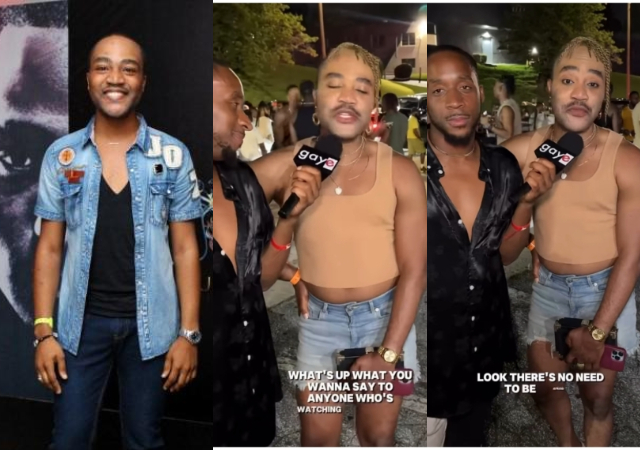In a move that has sent ripples through Nigeria’s entertainment industry and LGBTQ+ community, former Hip TV presenter Dayo Ephraim has publicly come out as gay. The announcement, made during a recent interview, marks a significant moment in the ongoing conversation about sexuality and identity in Nigeria and across Africa.
Dayo Ephraim, who relocated to the United States several years ago, chose to share his truth in a candid and unapologetic manner. I’m gay, living in my truth,” Ephraim declared in the interview, his words resonating with many who have struggled with their own identities in a society often hostile to LGBTQ+ individuals.
The former presenter’s revelation was accompanied by a striking visual statement. Ephraim appeared in the interview wearing a crop top and a jean mini skirt, a bold choice that underscored his commitment to authentic self-expression. This sartorial decision, particularly noteworthy given the conservative dress norms often associated with Nigerian media personalities, served as a powerful symbol of Ephraim’s newfound freedom to express himself fully.
Ephraim’s journey from a well-known TV presenter in Nigeria to an openly gay man living in the United States is a testament to the complex path many LGBTQ+ individuals navigate, especially those from countries where homosexuality remains criminalized.
LGBTQ+ rights activist Chidi Okonkwo commented on the significance of Ephraim’s announcement: “For someone of Dayo’s profile to come out openly is incredibly brave and important. It sends a powerful message to LGBTQ+ Nigerians that they are not alone and that living authentically is possible, even if it sometimes means leaving one’s home country.
Ephraim’s coming out has sparked intense discussion in Nigeria, where same-sex relationships remain illegal and can carry severe penalties. The announcement has been met with a mix of support, shock, and criticism, reflecting the deep divisions that exist in Nigerian society regarding LGBTQ+ issues.
As a former TV presenter, Ephraim’s coming out also raises questions about LGBTQ+ representation in Nigerian media. His decision to live openly as a gay man after leaving his role at Hip TV highlights the challenges LGBTQ+ individuals face in the Nigerian entertainment industry.
Media analyst Tunde Ogundipe commented: “Ephraim’s story underscores the lack of visible LGBTQ+ representation in Nigerian media. It’s a stark reminder of the pressure many in the industry feel to hide their true selves to protect their careers.”
Ephraim’s ability to come out while living in the United States points to the significant role that the Nigerian diaspora plays in challenging social norms back home. Many LGBTQ+ Nigerians find greater freedom to express their identities after moving abroad, often using their platforms to advocate for change in Nigeria.
Immigration lawyer Bola Adeosun noted: “Cases like Dayo’s highlight why many LGBTQ+ Nigerians seek asylum abroad. The freedom to live openly without fear of persecution is a fundamental human right that, unfortunately, is not yet guaranteed in Nigeria.”
The response to Ephraim’s announcement has been swift and varied. Social media platforms have been abuzz with discussions, with hashtags like #DayoEphraim and #LivingMyTruth trending in Nigeria.
Supporters have praised Ephraim’s bravery, with one Twitter user, @ProudAlly, writing: “Dayo Ephraim is a hero. His courage will inspire so many young LGBTQ+ Nigerians to embrace their true selves.
However, the announcement has also faced backlash from conservative quarters. User @TraditionalValues tweeted: “This is not our culture. Dayo has been corrupted by Western influences.
Ephraim himself seems prepared for the mixed reactions. In the interview, he stated that he is not concerned about what people think and invited social media users to share their opinions, asserting that it won’t affect his choices.
Ephraim’s coming out occurs against the backdrop of ongoing struggles for LGBTQ+ rights in Nigeria. The country’s Same-Sex Marriage Prohibition Act, signed into law in 2014, criminalizes same-sex relationships and imposes severe penalties on those found guilty.
Human rights lawyer Femi Adeoye explained: “While Dayo’s announcement is a personal triumph, it also reminds us of the legal and social challenges LGBTQ+ individuals face in Nigeria. His ability to come out freely is, in part, due to the protections he enjoys in the US – protections that are sadly lacking in Nigeria.”
Ephraim’s public declaration could serve as a catalyst for further conversations about LGBTQ+ rights and acceptance in Nigeria. Activists hope that his visibility will contribute to greater understanding and eventual legal and social reforms.
LGBTQ+ advocate Joy Onyesoh stated: “Dayo’s story has the power to change hearts and minds. It puts a familiar face to the often abstract concept of homosexuality for many Nigerians. This personal connection can be a powerful tool for fostering acceptance.”
The reaction from Nigeria’s entertainment industry will be closely watched in the coming days and weeks. Ephraim’s former colleagues and other celebrities’ responses could indicate shifting attitudes within this influential sector of society.
Entertainment journalist Yemi Adebowale noted: “How the industry reacts to Dayo’s announcement could set the tone for future discussions about LGBTQ+ inclusion in Nigerian media. It’s an opportunity for the industry to take a stand for diversity and inclusion.”
As the dust settles on this groundbreaking announcement, the long-term impact of Ephraim’s decision to come out remains to be seen. Will it inspire other Nigerian celebrities to follow suit? Could it lead to more nuanced representations of LGBTQ+ characters in Nigerian media? Or will it result in a backlash that further entrenches discriminatory attitudes?
What’s clear is that Dayo Ephraim’s declaration of “living my truth” has opened up a new chapter in Nigeria’s ongoing dialogue about sexuality, identity, and human rights. His story serves as a powerful reminder of the personal struggles behind the political debates, and the courage required to live authentically in a world that often resists change.
As Nigeria continues to grapple with these complex issues, Dayo Ephraim’s voice adds a compelling personal narrative to a conversation that is far from over. In choosing to live his truth, he has not only reclaimed his own story but has also contributed to the broader narrative of LGBTQ+ experiences in Nigeria and beyond.



